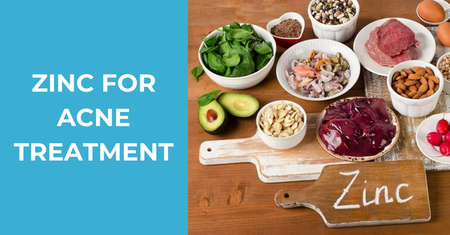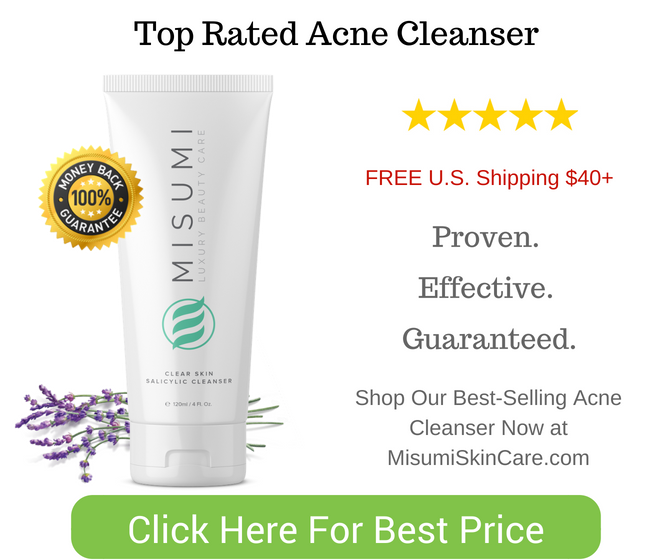Contents
Zinc is just one of the many nutrients that our bodies need and is often underestimated in its important role for the body. It has a strong role in protecting the human body and has been known for its healing properties.
Although it is known to help keep you healthy, it has actually been studied for medical purposes too, this also includes the treatment of acne.
Our article will tell you more about zinc therapy and who benefits from the treatment of zinc, including topical treatments to try at home, what zinc supplementation is good for, and does zinc for acne really work?
As mentioned above, Zinc is a very essential mineral that protects the immune system by fighting off harmful cells. It is also one of the most studied elements to date in many areas including skincare and in particular, acne. It is known to be effective in the treatment of acne, reducing acne, even down to severe acne.
It is naturally present in some foods, can be added to others, you can also get it as a dietary supplement. Zinc plays a huge part in immune function, protein synthesis, wound healing, and cell division. Zinc supports growth and development which is great during pregnancy and childhood. A daily intake of zinc is required for balance as the body has no specialized storage for it, always be aware of the zinc levels not to take too much or too little. Most zinc supplements are oral supplements.
The intake of zinc all depends on age and gender. Below are the up to date and recommended allowance for zinc levels
0 – 6 months –
Male 2mg Female 2mg
7 – 12 months –
Male 3mg Female 3mg
1 – 3 Years –
Male 3mg Female 3mg
4 – 8 Years –
Male 5mg Female 5mg
9 – 13 Years –
Male 8mg Female 8mg
14 – 18 Years –
Male 11mg Female 9mg
19+ Years –
Male 11mg Female 8mg (in pregnancy 11mg)
Before getting any sort of dietary supplement to help with your acne treatment, try to keep a note of the foods you’re eating and try to figure out if you’re getting enough zinc through your diet. Zinc absorption is best through food rather than supplements but like anything you need to be aware of your zinc levels.
Sources of Zinc
Food – a wide variety of foods such as oysters, red meat, beans, whole grains, nuts, certain types of seafood, and dietary products.
Dietary Supplements – Zinc supplements come in several forms, zinc sulfate, zinc gluconate, and zinc acetate.
Other sources – There’s zinc in various products like over-the-counter treatments that help with colds, you can get OTC products for acne treatment too.
Trying zinc supplements
You should only take zinc for acne under your doctor’s supervision. Zinc therapy and supplements will not be helpful if they’re not needed or used properly, if you consume more zinc than what you need it can lead to adverse effects be sure you keep an eye on your zinc levels and be sure you choose the right acne treatment.
Zinc is available over the counter (OTC) either combined with other minerals or on its own. It’s also in some multivitamins with vitamin e. Some serum vitamins have a small percentage of zinc in also, always be sure you get the correct products for your skin and individual needs. Zinc for acne is effective when it is used in the correct form, hence why this is one of the popular acne products.
You may see zinc labeled like one of the following –
- Zinc sulfate – this form, zinc sulfate has only been known to be effective towards pustules.
- Zinc acetate
- Zinc gluconate -this is safe for all skin types, dark to light, dry to oily, and is easily absorbed into the digestive tract.
Always talk to your doctor before thinking of taking any sort of supplements or adding them to your routine. Zinc supplements can interfere with some medications like prescription drugs, and those taken for autoimmune diseases. It’s important to check if you can still take zinc for acne if you do take any of the above.
Zinc deficiency –
Zinc deficiency is when the body doesn’t have enough of the mineral, zinc. Zinc deficiency can result in skin changes, cracks and a kind of glazed look can appear on the skin. Also, some people may even experience some of the following –
- Hair loss
- diarrhea
- infections
- changes in the nails
- loss of appetite
- weight loss
- feeling tired and irritable
- find wounds take longer to heal
- lack of taste and smell.
Always be sure to keep an eye on your zinc levels to try and avoid this happening.
zinc sulfate can help treat and prevent deficiency, your doctor or pharmacist will tell you the dose to take but there will be a leaflet you can read that will tell you all you need to know about zinc sulfate.
Can you consume too much?
Yes. too much zinc can be harmful, symptoms that you have consumed too much zinc can vary between nausea, sickness, diarrhea, and headaches.
How Does It Work?
Zinc can help fight bacteria and viruses. It also has an anti-inflammatory agent that may relieve some of the redness and irritation that mild acne can cause, it can also be helpful towards more moderate acne. It may even help reduce the appearance of acne scarring which is most common in more severe acne.
Zincs anti-inflammatory effects have also proven to help with other skin conditions such as –
- acne rosacea
- eczema
- melasma
How Should I Take It?
The form of zinc you can take for acne treatment will depend on a number of factors such as current skin condition, medical condition, and/or the current medication you may be taking. the research has been conflicting on which is the best form of zinc for acne.
Some studies say that oral zinc has been effective for inflammatory acne alongside bacterial types of acne such as Propionibacterium acnes.
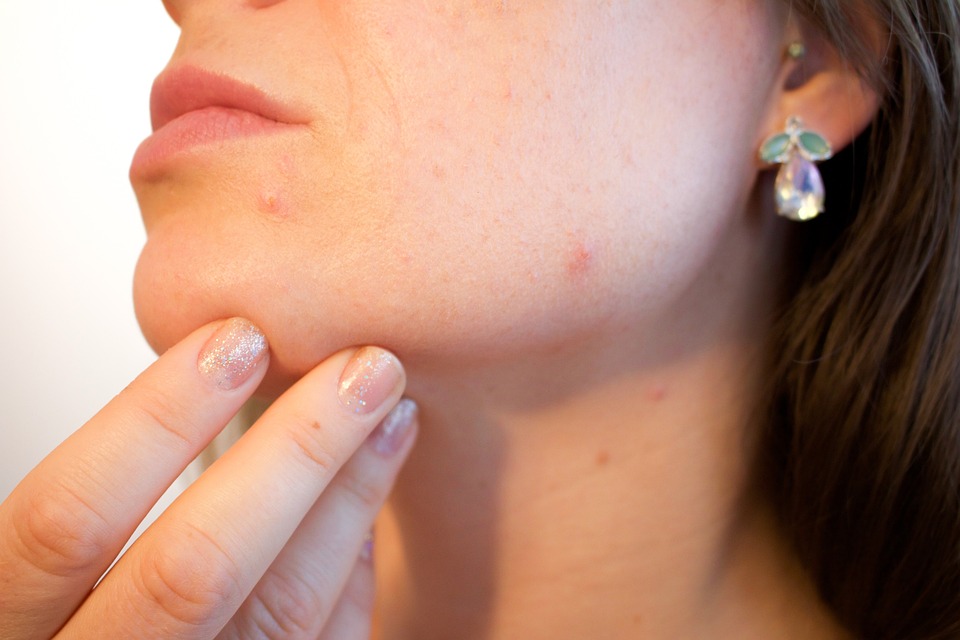
It has also been known for oral zinc to be effective towards mild acne, either way, as with anything, oral supplements have some kind of side effects which could include nausea and vomiting.
Topical zinc creams are supposed to have fewer side effects but it is not known to be as effective as oral zinc, that however doesn’t mean it is ineffective to treat acne.
With its anti-inflammatory effects, topical zinc can help clear acne bacteria and reduce excess oil production which then will not clog pores, therefore, resulting in reduced acne.
How you use zinc, whether it be oral zinc or topical zinc depends on acne severity, your diet, and your skin type. Below is a little guide on zinc and skin types.
Zinc for dry skin –
zinc oxide is good for dry, itchy skin and even rashes. By applying zinc oxide, it creates a barrier between the skin and the air and clothing giving the area time to heal, some people take a zinc supplement to help treat or prevent dry, itchy skin. Zinc oxide is known to be soothing to the skin.
Zinc for sensitive skin –
If you have more sensitive skin you should use more sunscreens that contain zinc, even on the more cloudy days it’s recommended to wear UV protection as UV rays still penetrate through the skin which is especially important if you suffer from a more sensitive type of skin. Try using oil-free products that are more water or gel-based.
Treatment of acne –
Another known benefit of zinc is its acne treatments and prevention of acne lesions. Zinc in the form of zinc sulfate or zinc gluconate is thought to help acne blemishes, reduce inflammatory acne, reduce the effects of hormonal acne and its effects on the skin. They have been known to be effective for more severe acne such as acne vulgaris.
If you want to use zinc in your acne treatments, you need to know which form suits your individual needs as it all depends on acne severity.
Dietary zinc and oral zinc supplements can be more effective on severe acne, also moderate acne vulgaris, Over the counter acne medications are usually unable to treat cystic acne/hormonal cystic acne.
Over-the-counter acne medications such as benzoyl peroxide and salicylic acid are known to be effective for every other form of acne. There is a paste you can get that actually has both zinc and salicylic acid in it.
If your acne lesions are milder, topical zinc may be all you need for your acne treatment. Mild acne includes whiteheads, blackheads, pustules, and papules.
As well as helping acne lesions, zinc has been known to help with the appearance of acne scars.
Also, be aware that topical zinc can take up to 3 months before seeing any visible results. If you still don’t see any results after this time it may be advisable to speak to your doctor, as they may recommend the use of oral zinc supplements.
ZINC AND ACNE – WHAT SCIENCE SAYS
Scientific research suggests that inadequate levels of zinc in the body could be linked with acne. Bringing your level of zinc up to adequate levels could reduce symptoms of acne by –
-Balancing hormone levels
-Reducing bacteria
-Calming inflammation
Oral Zinc – Appears to work as good as or almost as good as oral antibiotics for acne. Although it should be used alongside other acne treatments to see any dramatic changes.
Topical Zinc – It’s not been proven that topical zinc alone can improve acne. Although there are certain topical zinc compounds that could help topical antibiotics work better to treat acne.
Zinc is found in the body to provide essential support to your body’s defense system, skeletal system, nervous system, reproductive system, and digestive system. When it comes to the skin to treat acne zinc may help by –
- Balancing hormone levels – Higher levels of androgens normally leads to more acne. Zinc may act as an anti-androgen, this hormone is present in both males and females.
- Reducing bacteria – This is important as bacteria plays a huge role in acne.
- Calming inflammatory – This is important as these flare-ups can be painful.
Deficiency and Incidence
Low zinc levels were accordingly first reported in acne patients in the mid-70s. More recent reports have said that zinc levels are lower in people receiving acne treatments.
Several oral zinc for acne supplements is readily available over the counter in most stores. Some are absorbed into the intestines resulting in fewer side effects.
Zinc supplements include –
- zinc glucose – One of the most popular forms of zinc. Better for treating inflammatory acne.
- zinc ascorbate
- zinc citrate
- zinc octoate
- methionine bound zinc
A few years back, a number of studies took place that was mainly based on zinc and acne treatments. A collection of people took part in the study and below shows the conclusions they came to regarding those studies –
- Topical Zinc – Certain forms of topical Zinc, when this is used with antibiotics it could possibly help the antibiotics work better and more efficiently. However, you’re unlikely to notice any dramatic changes.
- Oral Zinc – This has been thought to be as effective as antibiotics. Most supplements containing zinc, have between 15-20% elemental zinc, this basically means a 50mg tablet will have between 7.5mg and 10mg of zinc which is known to be the ideal amount to have positive effects.
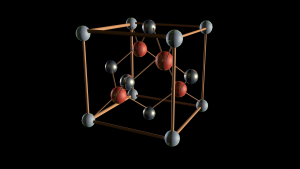 If you do decide to take supplements with zinc, or want to add zinc to your diet and or routine, be sure to keep it as balanced as possible and be careful your not take too much zinc, your body can’t physically absorb enough copper, this could lead to copper deficiency. not enough copper can also lead to muscle weakness, mental fatigue, and anemia.
If you do decide to take supplements with zinc, or want to add zinc to your diet and or routine, be sure to keep it as balanced as possible and be careful your not take too much zinc, your body can’t physically absorb enough copper, this could lead to copper deficiency. not enough copper can also lead to muscle weakness, mental fatigue, and anemia.
There have been numerous previous debates about using topically as they have temporary results, they work to some degree with some people, topical may help the antibiotics work a little better. In some cases, people have been taken off the antibiotics after a few months to prevent antibiotic resistance from getting any worse. Always ask your doctor if your want to use zinc for acne but are currently taking antibiotics already. If you do take them, always take them on time and finish the full prescribed course, if you miss any or decide to stop taking them before you should there’s a chance of causing antibiotic-resistant bacteria.
Some topical forms have been known to have a few mild side effects such as burning or/and itching, similar to the side effects of topical retinoids.
The Types of Acne That Zinc May Help With
Pustules – Swollen, red form of acne that can weep, it is often pus-filled. They’re usually painful to the touch, also if they are squeezed or picked it could lead to them leaving acne scars.
Acne vulgaris – This is one of the most common in acne breakouts.
Cystic acne – These sorts of breakouts cause a sac-like pocket which is also filled with puss.
Melasma – This is usually a breakout of hyperpigmentation or skin discoloration, this can be caused due to hormonal changes.
Rosacea – A skin disease that causes visible blood vessels, extreme redness, pinkish eruptions that are also pus-filled.
Comedones – This can happen when the follicles have become blocked from dead skin cells, excess sebum, and general air pollution/dirt, and make-up.
Whiteheads – A type of someone that completely blocks the opening of the pore or hair follicle. The skin’s life cycle tries to continue causing a layer to form which appears ‘white’. Never try to squeeze these as it can tear the tissue and then lead to scarring.
Blackheads – This type of someone is caused by the follicle or the pore to be completely blocked deeply but open at the surface, dead skin cells and oil build-up irregularly which causes clogging to diffuse the natural light, this is what makes them appear ‘black’.
Papules – These types of Comedones happen when they have become infected or inflamed. They can also cause some redness and can be sore to the touch.

Nodules – These are painful, inflamed lumps that lie just beneath the surface of the skin. Often caused by infection or invasive bacteria.
Zinc is one of the most studied natural treatments there is for the treatment of acne, here are some of the benefits it has –
Anti-bacterial – Some studies carried out using test tubes have shown that zinc eradicates acne-causing bacteria. Although it’s not quite as effective as antibiotics, zinc can be useful as bacteria won’t develop resistance to it. There’s also a homemade remedy for acne that has tea tree oil, zinc supplements, and azelaic acid. Tea tree is a well-known acne treatment that can help to clear skin and reduce acne.
Anti-inflammatory – When bacteria blocks a pore or follicle, severe irritation can develop in the area and cause pimples to become painful and red. Studies have shown that those with acne-prone skin, are more sensitive to bacteria., this is where zinc’s anti-inflammatory properties come in as it can calm the inflammatory response and help to reduce the bacteria.
Keratinocyte-reducing – Keratinocytes are called that produce keratin, keratin is a protein that binds skin cells together. Too much keratin prevents cells from separating which leads to clogging of the pores. By reducing keratin, zinc helps keep skin pores open.
DHT blocking– Zinc can reduce the amount of oil produced by the skin, just as other DHT blockers do. Although it isn’t a strong DHT, zinc can still be used to regulate the hormones that affect the skin.
Antioxidant – Zinc it as a powerful antioxidant, one cause of acne is damage to the sebum and studies have concluded that taking antioxidants can reduce acne.
So, while zinc is not a miracle treatment, numerous studies can support its use for acne. There have been over thirty studies that have evaluated the benefits of zinc, both by itself and combined with other treatments. Zinc reduces almost all the known causes of acne.
How long can it take for zinc to clear my skin?
Most drugs on prescription for acne can take two months at a minimum before seeing a response. Some studies say the healing time for zinc is varied, but it is recommended you try supplements for at least three months to see any noticeable changes.
How much zinc should I take?
The recommended amount is 30mg of elemental zinc daily. It is not recommended to take any more than 50mg because high dosages can cause stomach cramps and irritation to the gut.
#1 Zinc Picolinate 30 mg by Thorne Research
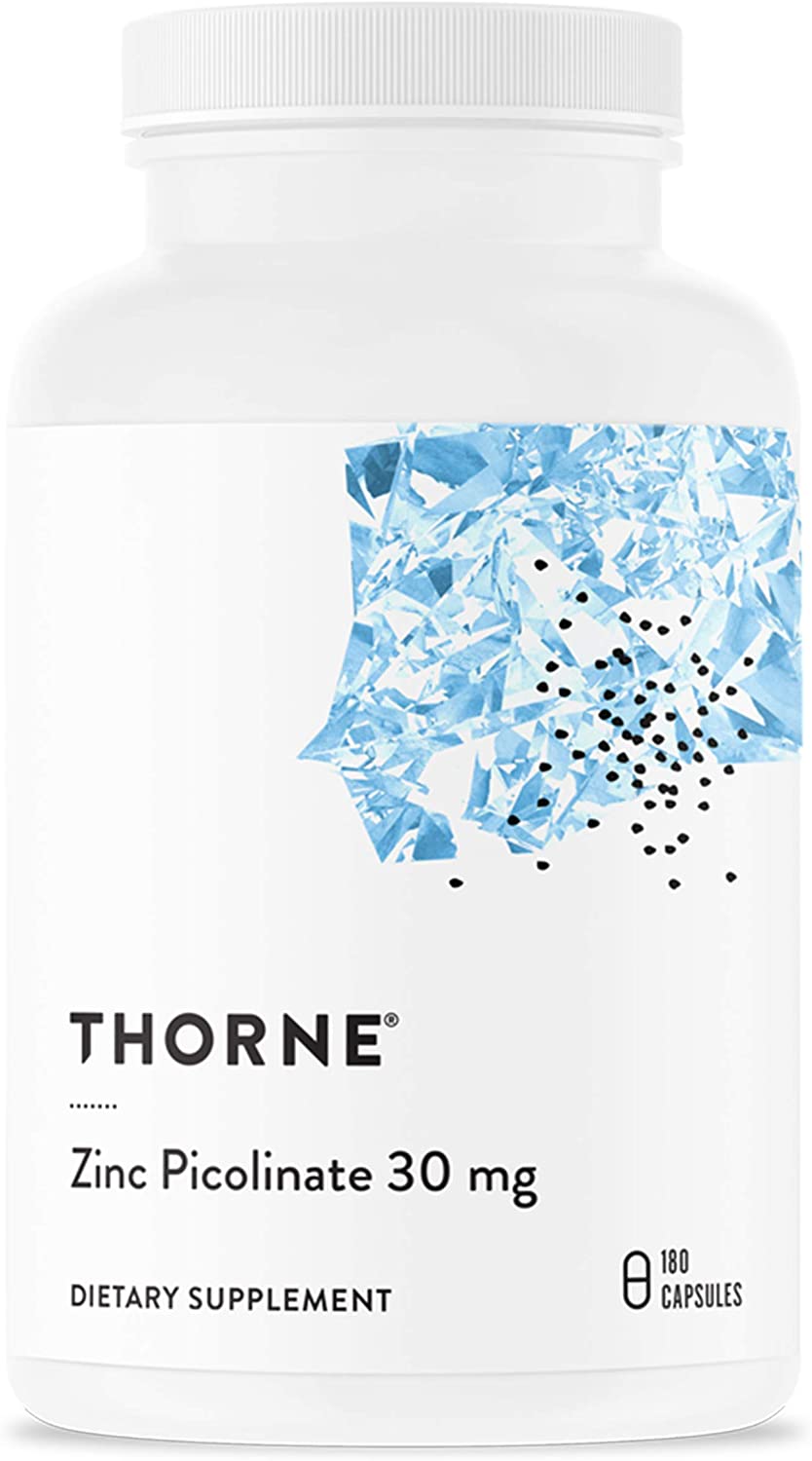
The product’s formula is completely natural meaning that all the ingredients are taken from natural sources and don’t contain chemicals.
Fairly good price for 180 capsules. Also, the product has very reassuring customer reviews.
Key features
- Promotes reproductive health
- Essential for growth and immune function
#2 SOURCE NATURALS Optizinc 30
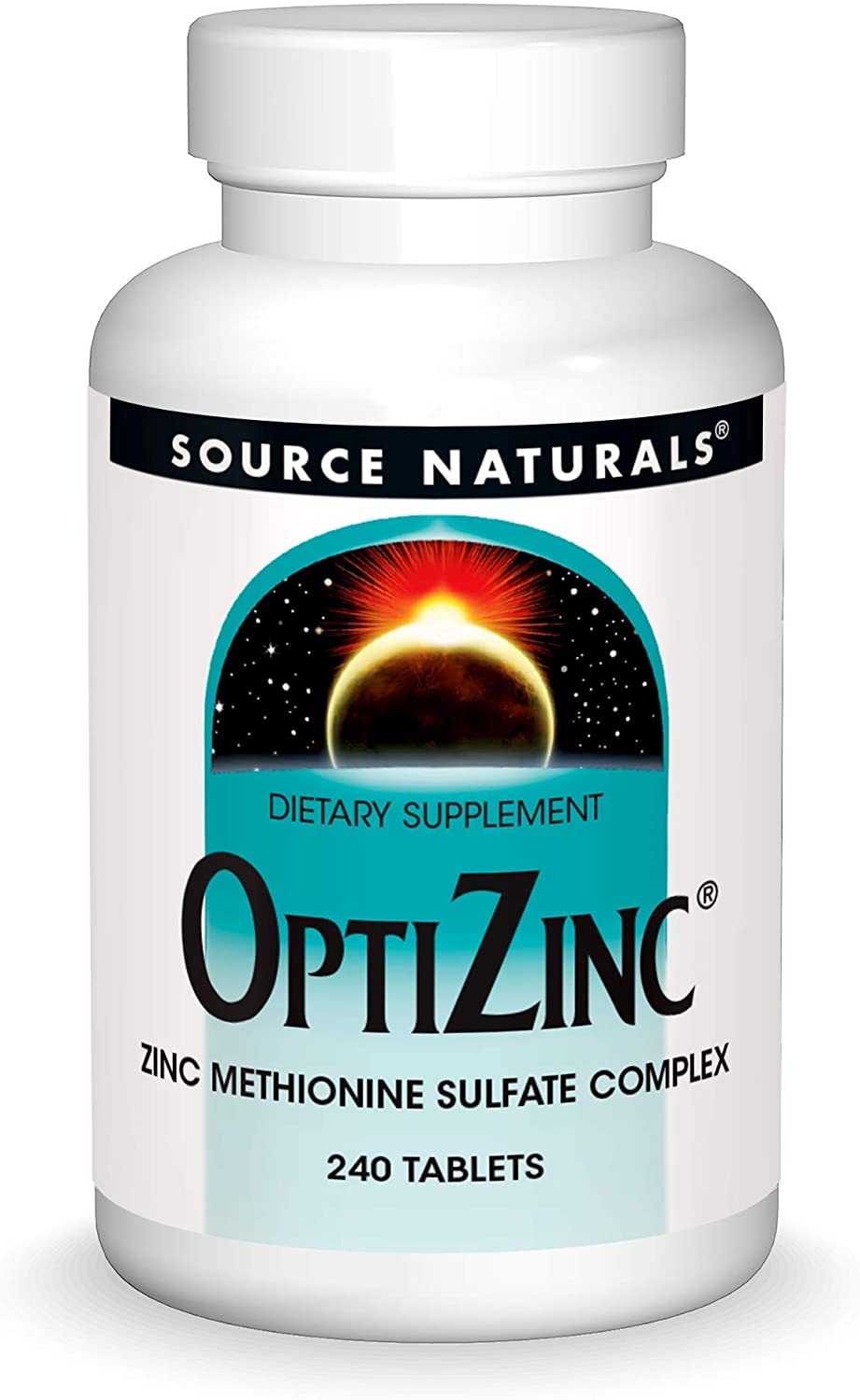
Optizinc is another name for zinc monomethionine.
The product has great bioavailability and is made of high quality ingredients. Great price for 240 capsules and 4.5 star user rating on Amazon with close to 300 reviews to support it.
Key features
- Antioxidants
- Suitable for vegetarians
#3 Nature Made Zinc Tabs – 30 mg
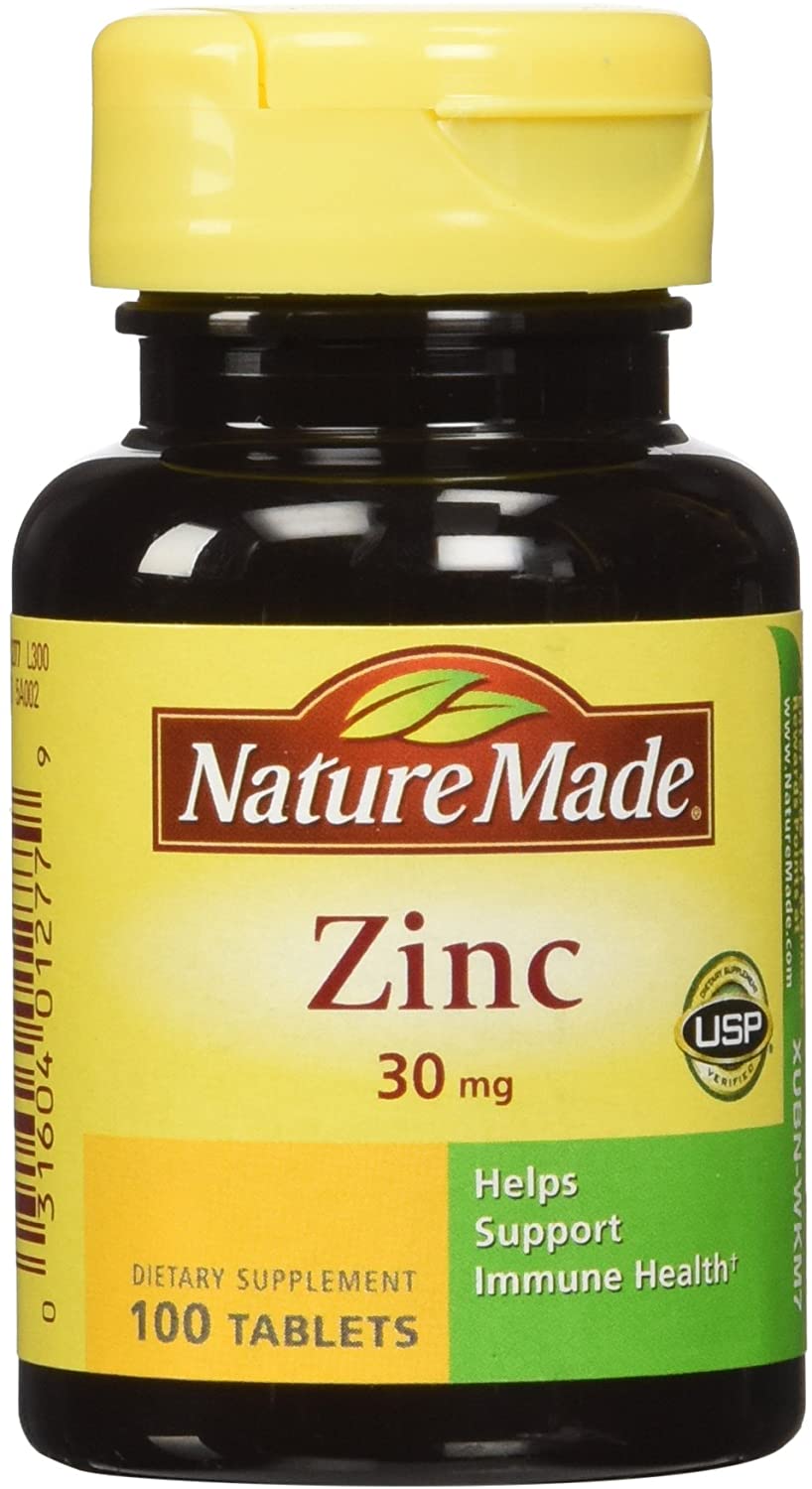
The all natural formula of the well-known manufacturer for various supplements offers high quality zinc gluconate with moderate absorption properties.
This is probably the most widespread version of zinc dietary supplements and the vendor offers a fairly good price for 100 capsules. Also, the product enjoys a 4.5 user rating on Amazon with over 200 reviewers sharing their experience.
Key features
- Nature Made
- Gluten Free
Recommended Dosage
Depending on the severity of your case, you’ll need to consume 30-50mg elemental zinc per day. However, be careful as too much zinc (especially when you take chemically-derived versions of supplements) can cause side effects like abdominal pain, diarrhea, headaches, loss of appetite, nausea, vomiting, and stomach upset.
How Good is Topical Zinc?
According to various studies, topical creams containing zinc can be effective in the treatment of acne, however, the effect is very minimal. Some manufacturers add zinc to antibacterial creams in an attempt to increase the effectiveness of clearing acne, but in reality, most of it is just marketing with no real benefits.
CONCLUSION
Overall, there is a lot of evidence (clinical, scientific as well as user experience-induced) that zinc can be beneficial for treating acne. While no study suggests that it will work 100% and will clear your acne for good, there is a fairly good chance that it will reduce acne by around 50% and boost your immune system, which in turn will help prevent future breakouts. Zinc is also an essential nutrient that the body needs for a number of various operations, which makes it even more appealing.
If you’re a long-time acne sufferer and haven’t tried zinc supplements, there is no reason why you shouldn’t. At the very least, it will improve your immune system and deliver a bit of relief in terms of breakouts or, it may very well prove to be the most effective treatment method for your specific case.
Have you tried zinc for acne treatment before? What results did you experience? Did it work for your case? Which supplements did you use? Share your thoughts with all of us in the comments!

